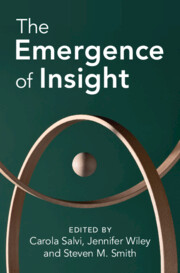Book contents
- The Emergence of Insight
- The Emergence of Insight
- Copyright page
- Contents
- Contributors
- I Introduction
- II Fixation and Insight
- Chapter 2 The Past and Future of Research on So-Called Incubation Effects
- Chapter 3 Forgetting and Inhibition as Mechanisms for Overcoming Mental Fixation in Creative Problem Solving
- Chapter 4 Overcoming Internal and External Fixation in Problem Solving
- Chapter 5 How Impasse Leads to Insight
- III Pathways to Insight
- IV After Insight
- V Cognitive Neuroscience of Insight
- VI Conclusion
- Index
- References
Chapter 2 - The Past and Future of Research on So-Called Incubation Effects
from II - Fixation and Insight
Published online by Cambridge University Press: 02 May 2024
- The Emergence of Insight
- The Emergence of Insight
- Copyright page
- Contents
- Contributors
- I Introduction
- II Fixation and Insight
- Chapter 2 The Past and Future of Research on So-Called Incubation Effects
- Chapter 3 Forgetting and Inhibition as Mechanisms for Overcoming Mental Fixation in Creative Problem Solving
- Chapter 4 Overcoming Internal and External Fixation in Problem Solving
- Chapter 5 How Impasse Leads to Insight
- III Pathways to Insight
- IV After Insight
- V Cognitive Neuroscience of Insight
- VI Conclusion
- Index
- References
Summary
So-called incubation effects refer to better resolution of an initially unsolved problem after putting the problem aside rather than working on it continuously. Although the effect is a familiar experience to most people, and the term appeared in 1926, incubation was not observed reliably in laboratory studies until the late twentieth century, when research began to focus on causes of and relief from fixation. We review research on incubation effects in creative problem solving, divergent thinking, and memory recovery. Although the term “incubation” erroneously implies the underlying mechanism is unconscious work, we refer to the beneficial effect of a break as an “incubation effect.” We review research showing that creative responses can be blocked by more dominant ones, a fixation effect, and forgetting dominant responses can enable incubation effects. Forgetting fixating responses can occur via temporal delays, retrieval inhibition, and context shifts, all of which can lead to incubation effects. Future research may discover what activity during the incubation interval is optimal for incubation effects, and should also examine the moments preceding an insight experience, a nascent period that may occur when one returns to an unsolved problem after fixation has been diminished.
- Type
- Chapter
- Information
- The Emergence of Insight , pp. 13 - 38Publisher: Cambridge University PressPrint publication year: 2024

